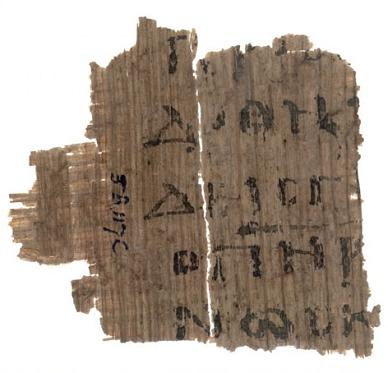| Change to Book/Chapter View |
|
|
|
Translation process is ongoing. For current status see details |
|
|

Papyrus 70 Discovered: Oxyrhynchus, Egypt Location: Oxford, England; Ashmolean Museum Contents: Matthew 2:13-16, 22-3:1; 11:26-27; 12:4-5; 24:3-6, 12-15 Notes: This manuscript is mostly a narrow vertical strip showing only a few letters in the middle of each line.
Matthew 2 13 Now when they had departed, behold, an angel of the Lord appeared to Joseph in a dream, saying, “Arise and take the young child and his mother, and flee into Egypt, and stay there until I tell you, for Herod will seek the young child to destroy him.” 14 He arose and took the young child and his mother by night and departed into Egypt, 15 and was there until the death of Herod, that it might be fulfilled which was spoken by the Lord through the prophet, saying, “Out of Egypt I called my son.” 16 Then Herod, when he saw that he was mocked by the wise men, was exceedingly angry, and sent out and killed all the male children who were in Bethlehem and in all the surrounding countryside, from two years old and under, according to the exact time which he had learned from the wise men. [..] 22 But when he heard that Archelaus was reigning over Judea in the place of his father, Herod, he was afraid to go there. Being warned in a dream, he withdrew into the region of Galilee, 23 and came and lived in a city called Nazareth; that it might be fulfilled which was spoken through the prophets that he will be called a Nazarene.
Matthew 3 In those days, John the Baptizer came, preaching in the wilderness of Judea, saying, [..]
Matthew 11 26 Yes, Father, for so it was well-pleasing in your sight. 27 All things have been delivered to me by my Father. No one knows the Son, except the Father; neither does anyone know the Father, except the Son and he to whom the Son desires to reveal him. [..]
Matthew 12 4 how he entered into God’s house and ate the show bread, which was not lawful for him to eat, nor for those who were with him, but only for the priests? 5 Or have you not read in the law that on the Sabbath day the priests in the temple profane the Sabbath and are guiltless? [..]
Matthew 24 3 As he sat on the Mount of Olives, the disciples came to him privately, saying, “Tell us, when will these things be? What is the sign of your coming, and of the end of the age?” 4 Jesus answered them, “Be careful that no one leads you astray. 5 For many will come in my name, saying, ‘I am the Christ,’ and will lead many astray. 6 You will hear of wars and rumors of wars. See that you aren’t troubled, for all[1] this must happen, but the end is not yet. [..] 12 Because iniquity will be multiplied, the love of many will grow cold. 13 But he who endures to the end will be saved. 14 This Good News of the Kingdom will be preached in the whole world for a testimony to all the nations, and then the end will come. 15 “When, therefore, you see the abomination of desolation, which was spoken of through Daniel the prophet, standing in the holy place (let the reader understand),
[1] Here the manuscript and the Majority Text are in agreement against the critical text, which does not have the word “all.” |
How to read these pages: • The
translation to the left is based on the World English Bible. Words in regular
black font are words in the manuscript matching the Majority Text for that
passage. • Words
in italics cannot be seen in the manuscript, since the manuscript is
fragmentary. These words are supplied for readability by the World English
Bible translation. • Words
present in the manuscript but with some letters unreadable or missing are in blue
like this: blue. One Greek word often is
translated into multiple English words, and when this occurs, all the English
words are in blue. • Words
present in the manuscript but with spelling or trivial word order differences that do not affect the
meaning are in green like this: green. • If
the manuscript is different from the Majority Text, words in the Majority
Text that are missing from the text of the manuscript are marked through in red
like this: • If the manuscript is different from the Majority Text, words in the manuscript that are not in the Majority Text are underlined in red like this: new words.If the manuscript differs from the Majority Text yet matches another well-known text, this is noted in the footnotes.
|
